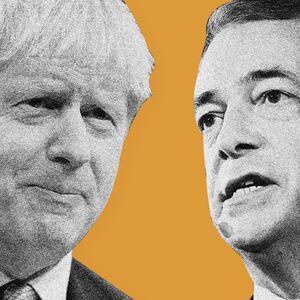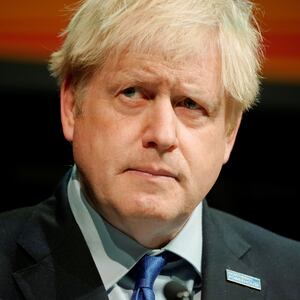LONDON—Stop me if you’ve heard this one before.
The British Prime Minister has secured a compromise Brexit deal with Europe that will ensure Britain’s orderly exit from the union if the parliament in London will back it.
As Theresa May found out on three brutal—and career-limiting—occasions that is an awfully big ‘if.’
The latest agreement will be put to a vote on Saturday just 12 days before Britain is scheduled to crash out of the European Union without a deal.
There is no doubt that Boris Johnson has extracted more concessions from Europe than his predecessor achieved but that’s partly because he caved on his own red lines when it came to the intractable issue of Northern Ireland.
Johnson now has 36 hours to charm, cajole and bully British lawmakers to fall into line and pass a deal that would bring to an end the three-year ordeal of Brexit negotiations. If he fails, he will try to force Britain out without a deal, but that gambit is legally treacherous and unlikely to succeed, paving the way for a snap election campaign that is likely to be the most divisive and heated in modern times.
May tried to get her compromise deal through the Commons three times. At the first attempt in January she rewrote British political history by suffering an unprecedented 230-vote defeat. She suffered another massive defeat—by 149 votes—the second time she asked. By then she was so desperate that she promised to quit if lawmakers finally approved her deal at the third attempt in March, but she was still defeated by 58 votes.
Two months later she announced her resignation, allowing the head of the Brexit campaign, Boris Johnson, to become prime minister. He said he would guarantee that Britain left the EU by Halloween and pledged to knock the EU into shape by making a credible threat to leave without a deal.
Three months later, he has succeeded in getting the EU to reopen negotiations—which they initially refused to do—and signed up to a new compromise deal, which ditches the hated “backstop” insurance policy that May had accepted.
The deal Johnson has struck is fiendishly complex but essentially he has replaced the backstop, which would have kept Britain closely aligned to the EU if there was no agreement on a future relationship, with something that looks very much like the backstop but only applies to Northern Ireland, which shares a land border with the EU in the Republic of Ireland.
In order to prevent the creation of a hard border on the island of Ireland, he has agreed to the creation of a customs border in the Irish Sea, which effectively separates Northern Ireland from the rest of the British economy.
This is something Johnson vowed he would never countenance, describing such an arrangement in September of last year as “a monstrosity” that “would amount to a change in Northern Ireland’s constitutional status without its people’s consent.”
Johnson’s governing partners, Northern Ireland’s Democratic Unionist Party (DUP), used similar language on Thursday when they rejected the prime minister’s new deal out of hand.
“Following confirmation from the Prime Minister that he believes he has secured a ‘great new deal’ with the European Union the Democratic Unionist Party will be unable to support these proposals in Parliament,” an official party statement said. “The Government has departed from the principle that these arrangements must be subject to the consent of both unionists and nationalists in Northern Ireland.”
These words—delivered within an hour of Johnson tweeting that a deal had been secured—were a hammer blow to his chances of delivering Brexit and remaining in office beyond this month.
The views of the fringe DUP grouping, which has just 10 lawmakers in the 650-seat House of Commons, would be a niche concern were it not for the Conservative government’s perilously fragile grasp on power.
The DUP’s opposition to May’s deal even though she had paid handsomely for their support in a billion-pound 2017 agreement was one of the most damning indictments of her attempt to secure a deal.
Johnson currently commands a majority of -45, and that includes the support of the DUP, so he needs every vote he can get. Worse than that, members of the DUP leadership are trusted advisors to the Conservatives’ most hardline Brexiteers, who will weigh their hostility before deciding whether to support the government in a crunch vote this weekend.
The parliamentary showdown will take place on just the fourth occasion since World War II when the House of Commons has been in session on a Saturday.
The Labour Party leadership condemned Johnson’s deal as “worse than May’s deal” and the ultra-Remainer Lib Dems concluded this was “desperation from the prime minister.” With the Scottish National Party also implacably opposed, Johnson’s hopes of passing the deal lay in the hands of Labour rebels, some of whom will defy their leadership because they believe the result of the 2016 referendum should be delivered, as well as 21 lawmakers he booted out of the Conservative Party just last month for being against a No Deal Brexit.
Johnson is taking a huge risk by putting the deal to Parliament in the knowledge that it might go down. Brexit Party politicians have long seen this scenario as their best chance of wiping out the Tories at the next election where they would paint Johnson as a sell-out who crumbled in negotiations with the EU and still failed to deliver Brexit.
If Johnson loses on Saturday and then asks the EU for an extension, the opposition parties have said they would vote to call an election. There is still the chance that the EU would refuse to grant Britain an extension, leading to a No Deal scenario, but that is unlikely.
The Conservatives hope that the prospect of No Deal helps to motivate Conservative waverers and potential Labour rebels to back the deal.
“Win win for the Tories. Either we secure the vote and we leave by 31, or we don’t because those who say they want a deal have turned down the deal, in which case it’s hey-ho and onto the general election,” a government minister told The Daily Beast. “If we can secure the deal without the DUP then it’s even better. It rips the teat from their mouth, allows a distance to be demonstrated between Tories and DUP, and it means going into a general election on a better footing.”
Despite the blustering confidence of some in No. 10, Conservative pollsters have indicated to The Daily Beast that a resurgent Brexit Party would pose an existential threat to Johnson’s government in a post-extension election.
Johnson’s decision to sack any colleague who voted against him to outlaw a No Deal Brexit in September may come back to haunt him. Without any of their support he is almost guaranteed to fail on Saturday. Some of them have already swallowed their pride and indicated that they will vote with the government; others have said they will not vote for the deal; and the rest will be torn over one of the most consequential parliamentary votes of their careers.
There was another casualty of the sacking of the 21. Jo Johnson, Boris’ little brother, quit the government in disgust saying he could no longer reconcile “family loyalty and the national interest.”
With every vote set to count on Saturday, what chance is there Boris Johnson’s little brother is the man who effectively ousts him from power?
Additional reporting by Jamie Ross.








